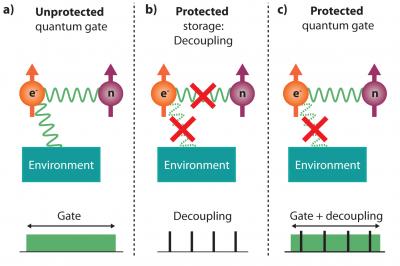Researchers Succeed in Decoupling Qubits From Environment
Researchers at Ames Laboratory's team claim to have found a way to significantly reduce the environmental impact on qubits to avoid that stored quantum information is being lost lost.

"The big step forward here is that we were able to decouple individual qubits from the environment, so they retain their information, while preserving the coupling between the qubits themselves" said Viatsheslav Dobrovitski, a physicist at the U.S. Department of Energy's Ames Laboratory.
The team built what they call a hybrid system for quantum processing that has different types of qubits for different purposes. In this case, there was an electron and a nucleus with measurable magnetic states. "This type of hybrid system may be particularly good for quantum information processing because electrons move fast, can be manipulated easily, but they also lose quantum information quickly. Nuclei move very slow, are difficult to manipulate, but they also retain information well," said Dobrovitski. "You can see an analogy between this hybrid quantum system and the parts of a classical computer: The processor works fast but doesn't keep information long, while the memory works slowly but stores information for a long time."
Decoupling of qubits from their environment has been considered for some time to be a method to increase the time of quantum data being retained. However, so far the decoupling was an all-or-nothing question and even the qubits were decoupled from each other. Dobrovitski said that he found a "narrow window of opportunity where both the electron and nucleus can be decoupled from their environment, while retaining their relationship to each other." As a result, both qubits can store their information reliably. The scientist believes that the discovery will open a door to robust quantum computation with solid-state devices.
Get Tom's Hardware's best news and in-depth reviews, straight to your inbox.

Douglas Perry was a freelance writer for Tom's Hardware covering semiconductors, storage technology, quantum computing, and processor power delivery. He has authored several books and is currently an editor for The Oregonian/OregonLive.
-
willard Great, now let's solve the problem of being unable to actually entangle any useful number of qubits for any useful length of time. A world record of eight entangled particles is a few orders of magnitude away from having any kind of practical application.Reply -
michaelahess "Researchers at Ames Laboratory's team claim to have found a way to significantly reduce the environmental impact on qubits to avoid that stored quantum information is being lost lost."Reply
Wow, just...wow... -
stingstang This sounds like just another accident that happened in the world of quantum computing which can't be replicated to any sustainable degree.Reply -
kaisellgren "to avoid that stored quantum information is being lost lost."Reply
I believe one "lost" is enough. -
blazorthon Not even the fact that I've seen so many mistakes in articles that my eyes just auto-correct most of them saved me from this article. I often miss the mistakes because I'm so used to them, but this is just too much...Reply
Come on Tom's, you're better than this!
Otherwise, it's an interesting article to read. Quantum computing may have gotten another huge step down the road. Of course, even if they get it working, we probably won't see anything come of it in the consumer markets until current technologies have been bled dry and scaled as far as they will go, but's it's still fun to read into these things. -
husker atmos929"narrow window of opportunity" does not sound very robust to meActually, it is a good thing that the opportunity is narrow as long as they can consistently take advantage of it. You don't want lots of random environmental events decoupling your qubits, my good fellow. You want to know exactly when and how it can be decoupled and then it is locked in place. Think of a bank vault which has a very narrow opportunity to be opened - only when the exact conditions are met. This makes for a robust bank vault and is a good thing.Reply